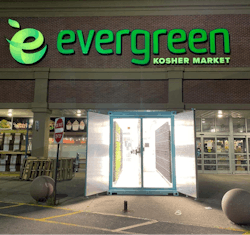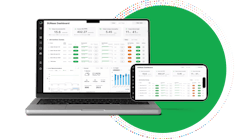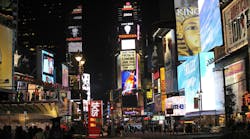Israel-based agtech specialist Vertical Field has announced installation of a vertical farm just outside the front door of a Monsey, NY supermarket called Evergreen Kosher Market. The LED-lit growing chamber will be utilized to deliver fresh lettuce, kale, arugula, basil, and more to customers with the greens being pesticide free. Unlike most vertical farms, Vertical Field uses a geoponic or soil-based approach that the company says delivers better yield and superior produce relative to hydroponic, aeroponic, or aquaponic approaches.
Our coverage of the Evergreen market project is the second recent news story that we’ve posted relative to growing chambers located at the point of sale. Just a few weeks ago we covered new investment in Germany-based Infarm that has vertical farms intended for in-store usage. And a few years back, we covered a shipping container-based farm installed outside the Dallas Central Market. Locating a growing operation at a retail store provides the ultimate in fresh produce. Moreover, the lack of any transportation time equates to longer shelf life and also reduces impact on the environment.
But what caught our eye about the Evergreen project is the geoponic approach, which is simply the scientific way to say that the crops are gown in soil. We have covered vertical farming extensively going back to 2016 and in a foundational article we published on horticultural lighting. Most such vertical farms use some medium — coconut husk, for instance — in place of soil to surround the plant roots and provide some structure for the roots. The plants are fed hydroponically via a circulated water system that mixes in nutrients.
Alternatively, we have also covered the aeroponic approach. The article linked in the prior paragraph described how Aero Farms uses no medium with the roots suspended in air, and the plants are fed via a circulated mist. The aquaponic approach, meanwhile, combines a plant farm with a fish farm with water circulated continuously. The water output from the fish tanks carries nutrients to the plants and the plants essentially filter the water that’s routed back to the fish tank.
A geoponic farm relies on soil with all of the nutrients mixed in that are required to feed the plant during the relatively short leafy-green grow cycle. The farms still require some distributed system to deliver plain water, but the plumbing is far less complex than in a hydroponic system. So the geoponic system costs less to install up front and Vertical Field says it also takes less expertise to operate successfully.
Vertical Field further claims that a geoponic system shaves some time off the growth cycle and that using soil takes the controlled environment agriculture (CEA) environment a step closer to Mother Nature and improves taste. Indeed, some foodies believe in the concept of terroir that’s popular with wine enthusiasts, which suggests that the soil and other environmental factors influence the ultimate taste of fruit or vegetables. Others dismiss the notion. Still, in any event, the geoponic approach delivers pristine produce with no pesticides.
The Evergreen market will push the “buy local” message. “We are gratified to be the first kosher supermarket in the country to introduce the vertical farm,” said Malki Levine of Evergreen. “Our customers are very much looking forward to buying fresh produce that is grown in our own backyard rather than being transported on long hauls from farms across the country. They will also appreciate the significantly reduced level of infestation, a major concern of kosher consumers.”
Our HortiCann Light +Tech conference that will take place Oct. 20–21 will cover the agtech space including lighting and other technology, such as the sensors and computer controls used in products such as the Vertical Field farms, to optimize the growing cycle. Our HortiCann event will be held virtually this year due to the coronavirus pandemic.
For up-to-the-minute LED and SSL updates, why not follow us on Twitter? You’ll find curated content and commentary, as well as information on industry events, webcasts, and surveys on our LinkedIn Company Page and our Facebook page.





